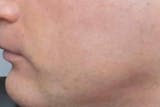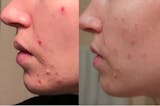Allergy testing for eczema helps identify substances triggering the immune system, aiding in managing the condition.
Eczema triggers can change over time, so regular reevaluation and testing can help manage symptoms effectively, especially for adults exposed to different allergens.
Eczema, affecting millions of individuals globally, is a recurring skin condition typified by red, itchy, and inflamed skin outbreaks. The degree and length of these flare-ups are influenced by three key factors:
Trigger intensity is the product of the quantity of substances your body is exposed to which trigger your immune system to react and the amount of time your body is exposed to them. These can often be common allergens, or they can be more specific to your body. Identifying your triggers allows you to lower exposure time and quantity of triggers in your environment.
Allergy testing for eczema can help you discover which substances, or allergens, are triggering your immune system and causing your symptoms. These tests can provide valuable information that your healthcare provider can use to help you manage your condition.
It is important to note that while these tests are extremely useful, they do not cover all potential triggers. Substances that are not common allergens or other factors, like stress or certain fabrics can also trigger eczema but are not typically part of a standard allergy test. Don’t worry - we have you covered on those as well.
JUMP TO SECTION:
Skin Allergy Tests for Eczema
Allergy testing can provide valuable insights into what might be causing your flare-ups. There are several types of skin allergy tests that your doctor may suggest: blood tests, skin tests, and patch tests. Each of these tests offers different insights and can be valuable tools in your broader eczema management strategy.
Skin Prick Testing
In skin prick tests an extract is applied to a clean and marked patch of skin. A small needle or lancet is used to prick the skin through the allergen extract to break the outer skin barrier.
This is usually not painful, nor deep enough to draw blood. The skin is then observed 15 minutes after the prick to look for reactions. If you're allergic to the substance, you'll develop a raised bump or rash at the test site.(OLE 2021)
Skin prick tests can test numerous allergens simultaneously and are generally used to determine if there is an immediate allergic reaction.
However, like every other test, they come with certain limitations. For instance, they may not be suitable for individuals with severe eczema, as their skin could react differently to allergens. Furthermore, certain medications may interfere with the results, making it less reliable in such cases.
Patch Testing
In a patch test, tiny amounts of potential allergens are applied to adhesive patches, which are then placed on your skin. The patches stay on for 48 hours, and your skin's reaction is assessed at 48 and possibly 96 hours after application making it a great test for assessing delayed reactions.(DAV 2011)
Common allergens to test with this method include latex, medications, fragrances, resins, hair dyes, metals, sulfates, and preservatives.(OLI 2012)
A patch test can be particularly helpful in identifying triggers for a type of eczema known as contact dermatitis, which is caused by direct skin contact with allergens. Common triggers for contact dermatitis include metals (such as nickel), rubber, and certain hair dyes.
Patch testing requires an area of skin which is clear from eczema for the allergens and patches to be applied. In adults, it is often applied to the back.(OLE 2021)
Like other tests, patch testing has its pros and cons. While it can be a valuable tool in identifying triggers, it can be a bit cumbersome as it requires multiple visits to the clinic and you need to keep the test area dry for the entire period.
Blood Testing
A blood test for eczema works by looking for specific antibodies in your blood. During a Th2 immune response, it produces antibodies called immunoglobulin E (IgE). These antibodies trigger the release of certain chemicals, one of which is histamine, that lead to allergy symptoms.
During a blood test, a small volume of blood is taken from an individual and this is inspected for the presence of IgE for a number of allergens. The result will give a count per unit volume of blood and this can indicate the likelihood of an allergy being present. The count does not necessarily indicate the severity of the sensitivity. It is possible for someone to have specific IgE for a substance but actually not experience any noticeable allergic reaction when exposed to the substance.
Blood tests are not always the first choice for allergy testing, as they can be less sensitive than other methods. They are typically used when skin tests are not possible or practical: for instance, during pregnancy, or in individuals who have severe skin conditions, or those on certain medications.
Food Allergy Tests for Eczema
Food allergies are another potential trigger for eczema, especially in children. It is estimated that up to 30% of children with eczema may also have food allergies. The most common foods associated with eczema and food allergies include milk, eggs, wheat, soy, and nuts. However, any food can potentially cause an allergic reaction.
If you suspect that certain foods are triggering your eczema symptoms, your healthcare provider may suggest a food allergy test. There are several types of food allergy tests, including blood tests and skin prick tests. These tests work similarly to the tests described earlier, by detecting the presence of IgE antibodies in response to specific foods.
Another method of food allergy testing involves an elimination diet, where you remove suspected foods from your diet for a few weeks and then gradually reintroduce them, one by one, while monitoring for symptoms. This can help identify foods that are causing reactions. However, elimination diets should always be carried out under the supervision of a healthcare professional to ensure that you're still getting all the nutrients you need.
It is important to understand that food allergies are just one potential cause of eczema. Not everyone with eczema will have food allergies, and not all eczema is caused by food allergies.
Allergy Testing for Eczema Over Time
The triggers of eczema can change and evolve over time, and thus it is essential to reevaluate triggers and management strategies regularly.
Allergy testing can be equally beneficial for adults with eczema as it is for children. Adults can develop new allergies, and old ones can fade away. It's also worth noting that adults can sometimes be exposed to different allergens compared to children due to lifestyle factors, such as work environments or dietary changes.
Therefore, regular allergy testing can help adults with eczema stay on top of their triggers and manage their symptoms effectively.
Moreover, adults with eczema should be aware of the risk of developing contact dermatitis. This form of eczema is caused by direct skin contact with certain substances, such as nickel, latex, or certain types of fabric.
If you find yourself developing eczema symptoms after touching certain materials, it could be worth speaking to your healthcare provider about patch testing.
Identifying Eczema Triggers Beyond Standard Allergy Tests
While allergy testing provides valuable insights, quickly, into many potential triggers for eczema, it is not a comprehensive solution. There are certain triggers that allergy tests do not cover or cannot identify. These include non-allergic triggers such as irritants, temperature changes, stress, and hormonal fluctuations.
We recommend tracking your symptoms to help you identify your specific triggers. In our article on tracking we show you how.
What Next?
Allergy testing, including blood tests, skin tests, patch tests, and food allergy tests, can be a crucial step in revealing your personal triggers and shedding light on what might be causing your eczema flare-ups. Regular allergy testing can be particularly beneficial for adults, as triggers can change over time.
But it is equally important to remember that not all triggers can be identified through standard allergy tests. We cover other potential triggers in our overview on triggers and dive deep into them in our articles on Allergies and Intolerances, Environment, Stress, and Things You Wouldn't Have Thought Of.
Share your experiences with us! Tell us what has and hasn’t worked for you. What did we miss in this article that you've found personally impactful? Your insights can help others better understand and manage their eczema.



